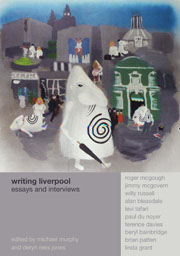Book contents
- Frontmatter
- Contents
- Acknowledgements
- List of Contributors
- Dedication
- Introduction: Sounding Liverpool
- 1 George Garrett, Merseyside Labour and the Influence of the United States
- 2 ‘No Struggle but the Home’: James Hanley's The Furys
- 3 Paradise Street Blues: Malcolm Lowry's Liverpool
- 4 ‘Unhomely Moments’: The Fictions of Beryl Bainbridge
- 5 A Man from Elsewhere: The Liminal Presence of Liverpool in the Fiction of J.G. Farrell
- 6 The Figure in the Carpet: An Interview with Terence Davies
- 7 ‘Every Time a Thing Is Possessed, It Vanishes’: The Poetry of Brian Patten
- 8 Finding a Rhyme for Alphabet Soup: An Interview with Roger McGough
- 9 Rewriting the Narrative: Liverpool Women Writers
- 10 Jumping Off: An Interview with Linda Grant
- 11 Ramsey Campbell's Haunted Liverpool
- 12 ‘We Are a City That Just Likes to Talk’: An Interview with Alan Bleasdale
- 13 ‘Culture Is Ordinary’: The Legacy of the Scottie Road and Liverpool 8 Writers
- 14 ‘I've Got a Theory about Scousers’: Jimmy McGovern and Lynda La Plante
- 15 Manners, Mores and Musicality: An Interview with Willy Russell
- 16 Subversive Dreamers: Liverpool Songwriting from the Beatles to the Zutons
- 17 Putting Down Roots: An Interview with Levi Tafari
- 18 ‘Out of Transformations’: Liverpool Poetry in the Twenty-first Century
16 - Subversive Dreamers: Liverpool Songwriting from the Beatles to the Zutons
- Frontmatter
- Contents
- Acknowledgements
- List of Contributors
- Dedication
- Introduction: Sounding Liverpool
- 1 George Garrett, Merseyside Labour and the Influence of the United States
- 2 ‘No Struggle but the Home’: James Hanley's The Furys
- 3 Paradise Street Blues: Malcolm Lowry's Liverpool
- 4 ‘Unhomely Moments’: The Fictions of Beryl Bainbridge
- 5 A Man from Elsewhere: The Liminal Presence of Liverpool in the Fiction of J.G. Farrell
- 6 The Figure in the Carpet: An Interview with Terence Davies
- 7 ‘Every Time a Thing Is Possessed, It Vanishes’: The Poetry of Brian Patten
- 8 Finding a Rhyme for Alphabet Soup: An Interview with Roger McGough
- 9 Rewriting the Narrative: Liverpool Women Writers
- 10 Jumping Off: An Interview with Linda Grant
- 11 Ramsey Campbell's Haunted Liverpool
- 12 ‘We Are a City That Just Likes to Talk’: An Interview with Alan Bleasdale
- 13 ‘Culture Is Ordinary’: The Legacy of the Scottie Road and Liverpool 8 Writers
- 14 ‘I've Got a Theory about Scousers’: Jimmy McGovern and Lynda La Plante
- 15 Manners, Mores and Musicality: An Interview with Willy Russell
- 16 Subversive Dreamers: Liverpool Songwriting from the Beatles to the Zutons
- 17 Putting Down Roots: An Interview with Levi Tafari
- 18 ‘Out of Transformations’: Liverpool Poetry in the Twenty-first Century
Summary
The Beatles were not the beginning of Liverpool music but they are an almost inescapable starting point. In fame and influence the group stands at the zenith of our narrative arc: in them we can trace everything that went before, and their imprint is seen on everything after.
Through the Beatles' writing we see a city's whole history distilled, its musical traditions alchemized. Never before, and seldom since, was an act so closely identified with its place of origin. In 1963 the Beatles' accent and presumed attitudes fed a universal conception of Liverpool as young, fresh, cheeky and optimistic. If the impression proved shortlived, there was at least an authentic connection between the group and its home city. This is not to stuff the butterfly back into its chrysalis – the Beatles were undeniably original, and developed in ways that nobody could have predicted. But our initial proviso remains: the Beatles were inheritors of Liverpool's musical tradition rather than its inventors.
John Lennon and Paul McCartney became songwriters because, in the feverish activity of Liverpool's beat scene, there was a shortage of American rock and soul songs for each group to cover. Few of their rivals aspired to be writers: in that time of Tin Pan Alley it was considered a specialist craft. (Ironically, the first Liverpool rock star Billy Fury, the Beatles' immediate predecessor, was a rare exception: he penned several songs, some under a self-effacing nom-de-plume, Wilbur Wilberforce.
- Type
- Chapter
- Information
- Writing LiverpoolEssays and Interviews, pp. 239 - 251Publisher: Liverpool University PressPrint publication year: 2007



